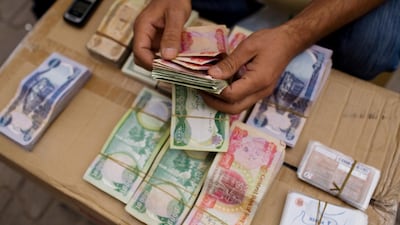Iraq and the US discussed on Wednesday plans to provide technical support to allow financing Iraq's foreign trade to be settled in other currencies other than the dollar. The aim of this would be to ease demand for the greenback in the local market, the Central Bank of Iraq said.
Assistant Treasury Secretary Elizabeth Rosenberg, who arrived on Tuesday, met the Governor of the Central Bank of Iraq Ali Al Alaq. Both discussed bilateral relations and measures taken by the bank to fight money laundering and terrorist financing, said the statement.
"They also discussed the possibility of providing technical support in the field of foreign trade financing through reputable banking channels with mechanisms that enable legitimate foreign trade financing, using different currencies, including the Euro, the Chinese Yuan and the UAE Dirham," it added.
Late on Tuesday, the US ambassador to Iraq said Ms Rosenberg would will hold “key meetings” with Iraqi government leaders and the Central Bank of Iraq.
“Progress on international anti-money laundering and banking reform will help combat corruption and support international investment in Iraq,” ambassador Alina Romanowski said on X, formerly known as Twitter.
Washington has been pressing Iraq since last year to stop the flow of the dollar through the foreign currency auction run by the Central Bank of Iraq to countries under US sanctions, including Iran, Syria and Lebanon.
The Federal Reserve Bank of New York has applied strict measures on requests for international transactions from Iraq, rejecting many and delaying others.
It has also blacklisted several Iraqi banks suspected of money laundering and of carrying out suspicious transactions. The latest was in July when it barred 14 private Iraqi banks from conducting dollar transactions.
This has led to an increase in demand for the US dollar on the black market in Iraq, leaving the Iraqi dinar trembling against the greenback.
Given the high trading volume between Iraq and Iran, Tehran has asked Baghdad to deal with the Euro, Yuan, Dirham, Iraqi Dinar or Iranian Rial, Iraqi Prime Minister Mohammed Shia Al Sudani told local media outlets on Monday.
"Now, the Central Bank of Iraq and the Central Bank of Iran are working on a mechanism to set a plan to organise this trade," Mr Al Sudani said.
At an annual forum organised in March by the Institute of Regional and International Studies at the American University of Iraq, Sulaymaniyah, CBI governor Ali Al Alaq described the efforts to achieve balance between maintaining a favourable exchange rate for Iraqis and compliance with international standards to stop money laundering as complicated.
"We had seen, unfortunately, a growing number of suspicious transactions, large amounts of transfers leaving the country on a fraudulent basis,” said David Burger, deputy US chief of mission at the US embassy in Baghdad during the same conference.
While the official exchange rate is fixed at 1,300 dinars against the dollar, the currency was trading at about 1,560 to the dollar on the black market on Wednesday.
In an attempt to control the exchange rate at the parallel market, the CBI has been introducing a series of measures to make the hard currency available at the official rate to traders and ordinary Iraqis wanting to travel abroad.
On the other hand, the Interior Ministry has barred traders from dealing in US dollars and asked them to sign an agreement to sell goods only in dinar. Offenders face a fine or jail sentence.
But these measures have failed to control the exchange rate and have only exacerbated the crisis.


